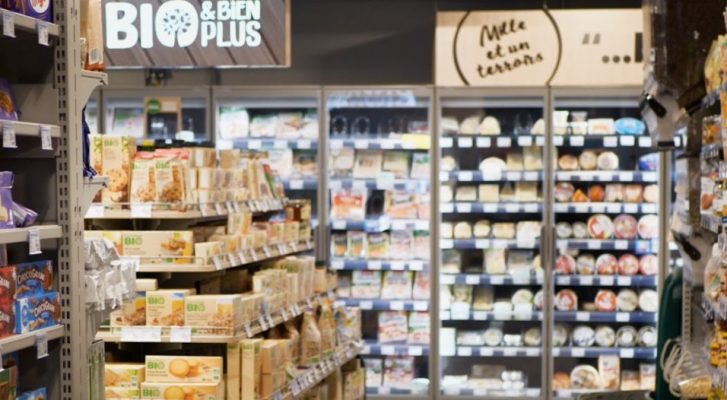Excess stocks, unadjusted orders, short expiry dates, seasonal products, promotions, new references, various contingencies…There are many causes of food waste by large-scale retailers and the cost for supermarkets is considerable! Each year, food stores throw away on average more than they earn (1.5% net results = 1.5% food loss¹). As a distributor, how can you limit these losses that cost you too much?

1. Managing the expiry dates of your products on the shelves
Fresh and extra-fresh products: proper management of expiry dates is an important step to avoid the waste of food products in your store. For various reasons, it often happens that a product is not purchased while it exceeds its freshness charter. Unfortunately, once this step is reached you have no other choice than to throw the product away. To avoid this waste, you can opt for early detection of your products that are close to the expiry date on the shelf. Knowing that they will expire in a few days, you will have time to implement a repurposing approach to guarantee their disposal!
Did you know? You can also manage expiry dates using an automatic tool for checking the dates of your products. Don’t have one? Discover Smartdetection, our solution that enables you to save time every day >
2. Offer waste- reduction discounts to your customers
Did you know that more than 9 costumers out of 10 ask retailers for more reductions on products whose sell-by date is approaching²? Not only do your customers want this, offering waste-reduction discounts enables you to reduce your unsold goods (and at the time same, to recover value from them)!
How does it work? Once detected and taken off the shelves, the products close to their expiry dates are labelled with a variable waste-reduction discount rather than being thrown away. Then they are moved to a dedicated waste-reduction area and sold that day! This enables you to avoid losing the products and recovering your profit margin from your unsold goods. Your consumers also benefit from an economic boost on products to be consumed more rapidly (and which are still as good). It’s simple.
3. Make up baskets of products close to their expiry date
Similar to the waste-reduction discounts on short-dated products, you can make up waste-reduction baskets: a group of food products close to their expiry dates and sold as batches for less money! These waste-reduction baskets are so-called “surprise” baskets: the consumers do not exactly know what they contain because they depend on the day’s unsold goods (vegetables, meats, yoghurts, bread, etc.).
A good alternative that introduces products to your consumers, offers them a good deal, and is environmentally friendly!
Discover Smartdiscount the intelligent waste-reduction labelling solution to sell off your unsold food goods
4. Donate your unsold goods to non-profits
To help stores in their fight against food waste, some countries also have a legislation. In France, for instance, since the Garot law was enacted, donating unsold food goods to charity organisations is mandatory in stores. More than a requirement, this approach is a good way to fight against waste while improving accessibility to high-quality food for those in need.
By giving your unsold food goods to charities, some countries, like France, allows stores to recover part of their value in return for a tax credit for donations. A win-win strategy which, combined with other repurposing actions, means that you don’t have to throw away products that can still be consumed.
Want to do more? With Smartdonation, give your unsold food goods with complete security >
5. Raise awareness among your consumers and employees around food waste
Fighting food waste means taking part in something that concerns all of us: distributors and consumers, in stores and at home. That’s way it’s important to inform your customers about this issue.
But how?
- By explaining the different expiry dates: Use-by date (formerly under another name), sell-by date, and recommended consumption date (only for eggs)! For example, some products with a best-before date are still consumable up to 18 months after their expiry day, with slight changes in appearance and texture that do not represent a health risk. So buying short-dated products is not a problem!
- By raising awareness around your waste-reduction commitment and its impact on your results: by signage and displays in stores and on your social networks. Information is key in fighting waste!
6. Work with your suppliers upstream of exceptional orders
To limit food waste, you can also turn to your food suppliers. During specific periods of the year (for example, December holidays and Easter) and for exceptional orders, your suppliers can offer you discounts on food merchandise. Excess unsold Christmas chocolates during December holidays can be directly recovered by the supplier so they are not thrown away. Don’t hesitate to contact them for specific details about repurposing!
7. Repurpose your food waste
Sometimes a product slips through the cracks and the repurposing streams are not enough to save it… Don’t panic, there are still many actions for finding another purpose: anaerobic digestion, composting, donating unsold goods for animal food, etc. Consult local partners around your store: associations, partners, farmers, etc. They can help you sell these products, which can still be used!
¹Average observed over 1000 audits conducted in superstores between 2017 and 2022
²OpinionWay-Smartway study 2022 “The French and food waste”
